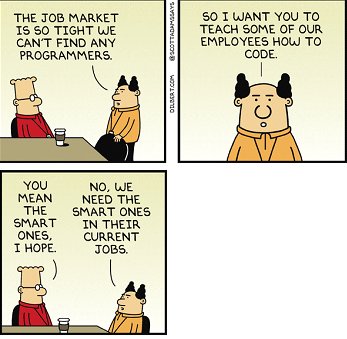After the comic, I explain a bit about comparative advantage (a post from 2018).
I think it means the not smart ones have a lower opportunity cost of their time, which gives them a comparative advantage.
Now the post from 2018:
Yesterday I posted a link to the new PBS series "First Civilizations"
which had an interesting episode on trade. Last year was the 200th
anniversary of David Ricardo's important idea called "comparative
advantage." It explains how two nations can benefit from trade even if
one country seems to be better at making all products than the other.
The Washington Post even had an article about it last year. It's the 200th anniversary of the most counterintuitive idea in the social sciences by Daniel W. Drezner, a professor of international politics at the Fletcher School of Law and Diplomacy at Tufts University.
Trade can benefit both sides. Otherwise, why make the trade? For
example, if you have bread and no water and I have water and no bread,
if I trade some water to you for some of your bread, we both gain or are
better off.
It might seem like if one country is "better" at producing all goods
than another, they have no room for trade. But even then, the seemingly
more advanced country will still gain from trade.
Here is an example that comes from
David Ricardo himself. Comparative advantage is when you can produce a good at a lower opportunity cost than
others face (in a two good example, it is impossible to have the
comparative advantage in both goods).
Suppose it takes 40 labor hours to make a barrel of wine in England and 2
hours to make a yard of cloth. In Portugal, those numbers are 10 and 1,
respectively. So it looks like Portugal is "better" at producing both
goods since it takes them less time to make wine and less time to make
cloth.
The labor hours numbers means that if England wants a barrel of wine, it would have to give
up 20 yards of cloth (since 40/2 = 20-if you don't produce a barrel of
wine, you save 40 hours of labor and you can make 20 yards of cloth in
that time).
In Portugal, if you want to trade a barrel of wine, you can get 10 yards
of cloth. Not spending 10 hours making wine allows them to make 10
yards of cloth.
So Portugal has the comparative advantage in wine since less cloth is
given up there (10 yards) than in England (20 yards) for every one
barrel of wine produced. That is a lower opportunity cost.
England would only give 1/20 a barrel of wine to make cloth while
Portugal gives up 1/10 a barrel. England has the comparative advantage
in cloth.
How can the two countries gain from trade? What if England trades 15 yards of cloth to Portugal for 1 barrel of
wine?
Both countries gain. England is better off since they only give up
15 yards of cloth to get that barrel of wine when normally they have to
give up 20.
Portugal gets more cloth (15 yards instead of 10) for that 1 barrel of
wine they trade. They are better off, too (even though it takes them
less time to make each product than in England).


No comments:
Post a Comment